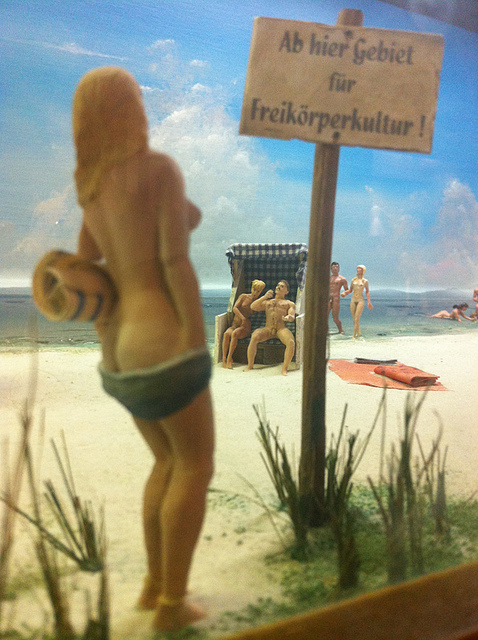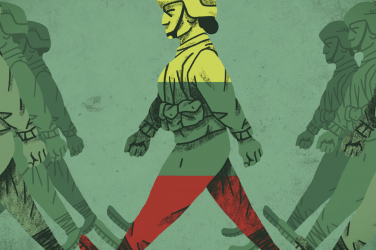From the protruding bulges of paunchy fetishists to the dangling flesh of nudist bathers, Germany has long played host to a festival of naked flesh. But new figures suggest that the naturist movement is in decline, while fewer young Germans are embracing the spirit of Freikörperkultur. It would be a sad loss, says Edgar Gerrard Hughes: Europe needs more non-sexualised nudity, not less.

I was strolling through a city park one overcast April afternoon when a naked man sidled nonchalantly out of the bushes, gnawing on an apple. Nobody else seemed to find the phenomenon at all remarkable and, half suspicious of my own perceptions, I walked on without a second glance. But the pasty panorama that confronted me when I turned the next corner was unmistakably real: sprawled across a small patch of lawn lay fifty middle-aged men and women, flicking through crime thrillers or filling out crosswords. Every one of them was unashamedly nude.
If I had encountered this scene in my native England, I might have assumed it was some hippy protest or a performance art work. But this was not Hyde Park: it was the Tiergarten in Berlin. And as I would quickly discover, Germany’s reputation for permissiveness when it comes to nudity is well earned.
Over the few months that I spent in Berlin, such spectacles became familiar. One sweltering morning a dreadlocked man boarded my carriage on the S-Bahn wearing nothing but a ragged pair of boxers. On another occasion I shared a ride with the bare breasts and buttocks of a gaggle of paunchy fetishists. Every trip to a lake or seaside brought new insights into the reassuring diversity of human anatomy. According to a recent survey, 28% of Germans – more than any other nationality – go skinny-dipping at least once a year.
Dangling flesh lost its novelty surprisingly fast. The spirit of “free body culture” even rubbed off a little on me: when getting changed in a public place, I no longer felt the necessity of awkward acrobatics behind a scanty towel. It’s not quite the spiritual emancipation that the free body movement’s most zealous advocates preach; but in a modest way I felt liberated too.
So when I came upon an article recently declaring that the Germans were falling out of love with nudism, I was a little dismayed. Membership of naturist societies is dropping by two percent each year. Younger Germans are reportedly less inclined to strip off than their parents, and I myself have witnessed a twenty-something Berliner wrinkling his nose in distaste at the sight of an ageing torso emerging from the Müggelsee. Was Freikörperkultur merely a flash in the pan? And how has my own Saxon culture ended up with such different attitudes?
Naked we are equal

In Berlin’s DDR Museum, overexposed dioramas of nudist beaches are arrayed alongside Spreewald pickles and squat “Trabbi” cars as nostalgic emblems of life in the former communist state. This splash of apparent free-spiritedness contrasts oddly with the drabness and rigidity generally associated with the Stasi state, and it is conventional to conclude that East German nudism was a rare instance of tolerated individualism in an otherwise repressive society. The Party could police your speech, your diet, your social status, your job – but in our state of nature we belong only to ourselves.
There is surely a lot of truth in this. But nudism was blossoming in Northern Europe before the Second World War. Besides, nakedness can signal conformity as well as revolt. Although the Nazis disbanded existing nudist societies (Göring called public nudity a “cultural error”), they encouraged naked sport among strapping Aryans and arranged carefully choreographed displays of the ideal human form. East German nudism was partly about rebellion, but some academics have suggested another explanation as well: naturism flourished behind the iron curtain because socialism blunted the influence of the Church.
In some ways, in fact, socialism and nudism are natural allies. Naturist groups have often been politically left-wing since the movement first blossomed in the late 19th century with “Naked we are equal” as one of its main rallying cries. One of the reasons why the Nazis were so quick to disband nudist societies was that many of them were explicitly anarchist. And some Germans believe that consumerism is at least partly to blame for the movement’s declining popularity. “Younger people are far less likely than their parents to strip off their trunks or bikinis in public,” said Kurt Fischer of the German Federation of Naturist Clubs in an interview with AFP, “in part because they regard fashion as a crucial marker of group identity.”
Fischer need not worry too much. While formal membership of nudist organisations may be in decline, millions of Germans still practice “uncommitted nudism” every year. In Sweden, too, I have shared a naked sauna with many an unconcerned stranger. Bare skin will remain a part of the Teutonic landscape for the foreseeable future. In my own country of Great Britain, by contrast, a bare bum is still taken as a naked provocation – as the case of Stephen Gough dramatically shows.
It’s only Adam and Eve
With a genuinely fanatical commitment to the nudist cause, Gough has twice walked the entire length of Britain clothed only in a pair of boots. His long-suffering genitals have overcome rain, frost and snow, but another obstacle has proved more obstinate: the law. Although there is nothing in the UK statutes that explicitly prohibits public nudity, Gough’s behaviour is deemed likely to cause “fear, annoyance and alarm” – and that is an illegal act. At regular intervals on his journeys the so-called “Naked Rambler” is arrested and imprisoned. When he is released, he simply strips off and carries on. It seems funny at first, but the story has a tragic aspect too: much of the past decade of his life has been spent behind bars, and as long as he maintains his stand against the UK’s court culture changes it is likely to remain that way. He is currently serving a 16-month sentence while his children grow up without him.

On one level, the Naked Rambler’s refusal to pull on a pair of jeans is clearly absurd. But absurdity should not be a crime. Gough never behaves in an intimidating or sexually aggressive way, as his lawyer points out. It is other people who impart offensive meanings to his appearance, and those same people walk past billboard displays of near-naked models every day without a second glance. Perhaps we have become incapable of perceiving nudity as anything other than a sexual provocation.
Anybody who has been to a nudist beach will tell you firmly that “it’s not about sex”. But I’m not sure that’s quite right. It’s not sexy, perhaps, and it isn’t usually about having sex. But as Oscar Wilde famously wrote, “everything is about sex except sex”. It seems to me that nudism represents the refusal to display yourself publicly as a sexual object: by hiding nothing and emphasising nothing, we refuse appraisal and appear simply as we are. In a culture saturated with sexual imagery and constant pressure to make ourselves attractive, maybe that’s a stand worth taking.
Few countries are as enlightened in their attitudes to the human body as Germany. But an anecdote from English history gives me hope that we Brits have our own more liberal traditions to draw on. One summer in the 1790s, a friend came to visit the writer and artist William Blake at his London house. When he opened the gate he discovered Blake and his wife stark naked, re-enacting a Garden of Eden scene from Milton’s Paradise Lost. Blake’s guest was made as if to leave, but the poet called him back. “Come in!” he cried. “It’s only Adam and Eve, you know.”
Cover photo: GioBertPhoto (flickr), CC BY 2.0






